Welcome to the January/February 2018 issue of Information Management
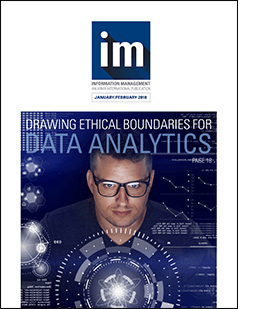 The articles in this first issue for 2018 underscore the need for organizations to have a fully represented information governance (IG) team to ensure that their policies and processes enable them to get the most value from their information assets and to minimize information-related risks. A focus on developing productive relationships with other IG stakeholders throughout 2018 is one that will pay dividends throughout your career.
The articles in this first issue for 2018 underscore the need for organizations to have a fully represented information governance (IG) team to ensure that their policies and processes enable them to get the most value from their information assets and to minimize information-related risks. A focus on developing productive relationships with other IG stakeholders throughout 2018 is one that will pay dividends throughout your career.
As you flip through our Upfront section, you will notice our new poll, which asks what limitations your organization places around data collection, use, and retention for data analysis purposes. Please answer our five-question, multiple choice poll to tell us. You can also take or check the results of previous polls at http://imm.explorearma.org/RIM_Polls.
You can access this issue by clicking on the individual article links below or by visiting here to browse the issue. (If you need help navigating the format, please refer to our FAQs.)

InFocus: A Message from the Editor
Developing Productive Relationships with Other IG Stakeholders in 2018
Vicki Wiler
Up Front:
News, trends, and analysis of interest to you and your organization

Drawing Ethical Boundaries for Data Analytics
Jennette Chalcraft, CPA, CA
Organizations are turning to increasingly sophisticated analytical tools and techniques to tap the potential value of the data they collect. While data analytics can help them push the boundaries of what can be done with that data, how far should those boundaries be pushed? Information professionals, who are already addressing the practical challenges of managing data, have an important perspective and skill set to help organizations wrestle with these ethical concerns.
CEO Perspective
Principles for Creating a Movement for IG
Jocelyn Gunter, IGP, CPA
In her article, ARMA International CEO clarifies terminology and the core concepts of information governance and asks the professional community to help create a movement where they are widely accepted, your value as a professional is elevated, and your career opportunities are expanded
The content below is available exclusively to professional and associate members of ARMA International. Others can learn more about this and the other benefits of membership by visiting www.arma.org/joinARMA or contacting our membership team at members@armaintl.org for personal assistance.
Forging a Partnership with IT for Technology Lifecycle Management
Sue Rock, CRM, and Dennis Trepanier, CRM, CDIA+, PMP
Information management (IM) professionals don’t have to be technology experts to play a critical role in co-managing their organization’s technology lifecycles with IT. But they do have to understand the technologies in use and emerging technology solutions, key IT processes, IT jargon, and how to introduce a business case showing the benefits of an IM/IT partnership to ensure that the organization’s technologies enable compliance with information-handling policies.
Fellows Forum Series
Taking the ‘Risky’ out of Cloud-Based Business
Patrick J. Cunningham, CISM, FAI
The technology innovations that gave rise to cloud-based products and services also dramatically increased the challenges for organizations to secure information that is created or stored in the cloud. Mitigating the risks associated with using cloud-based services begins with establishing controls against which potential cloud providers can be assessed.

Management Wise
Simple Methods for Determining ROI for Records Management Projects
William Saffady, Ph.D., FAI
This article was excerpted from the book Cost Analysis Concepts and Methods for Records Management Projects, 2d. Ed., which is available for purchase in the ARMA International online bookstore at http://bit.ly/2qe2vVU..
In Review
Challenging the Archives: A Call to Action for Archivists and Users
Charity Whan
In The Silence of the Archive, David Thomas, Simon Fowler, and Valerie Johnson issue a call to action for archivists, the subjects of archives, and archival users renew relationships among themselves.
In Review
Navigating the ‘New Normal” for Information Careers
Marc Kosciejew, Ph.D.
Rethinking Information Work: A Career Guide for Librarians and Other Information Professionals illuminates many traditional, alternative, and emerging career possibilities and shows some of the rewarding ways information professionals can apply their skills in different contexts.
Welcome to the March/April 2018 issue of Information Management
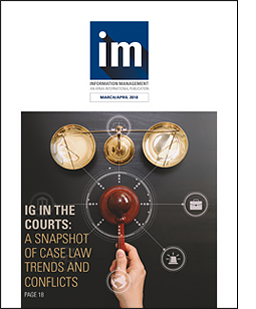 Recent advances in artificial intelligence (AI) have some declaring that the information age is giving way to the “machine learning” age. This does not present a threat to the future of information management (IM) professionals, though; it just signals another challenge. To meet the challenge, it is imperative to keep pace with technology – especially as AI matures and becomes more prevalent in the workplace. For those who need to first catch up and for those ready to charge ahead, this issue’s articles will help.
Recent advances in artificial intelligence (AI) have some declaring that the information age is giving way to the “machine learning” age. This does not present a threat to the future of information management (IM) professionals, though; it just signals another challenge. To meet the challenge, it is imperative to keep pace with technology – especially as AI matures and becomes more prevalent in the workplace. For those who need to first catch up and for those ready to charge ahead, this issue’s articles will help.
The Fellows Forum article by Susan Goodman, IGP, CRM, CIPP, CIPM, FAI, talks about the importance of aligning privacy with IM under the umbrella of an information governance (IG) program. We’d like to know which IG functional areas your IM program is aligned with – IT, security, legal, risk/compliance, and business units. Please take a few seconds to visit the poll and tell us. You can also take or check the results of previous polls at http://imm.explorearma.org/RIM_Polls.
You can access this issue by clicking on the individual article links below or by visiting here to browse the issue. (If you need help navigating the format, please refer to our FAQs.)

InFocus: A Message from the Editor
Arrival of ‘Machine Learning Age’ Signals New Opportunities for Information Professionals
Vicki Wiler
Up Front:
News, trends, and analysis of interest to you and your organization

IG in the Courts: A Snapshot of Case Law Trends and Conflicts
John C. Montaña, J.D., FAI
As information technologies and judges’ knowledge of these technologies have advanced, IG-related case law has exploded. This article explores this judicial evolution and a few cases involving the thorny issue of discovery of information on mobile devices.
The ‘Building Blocks’ of Training
Nancy Dupre Barnes, Ph.D., CRM, CA
Information management (IM) professionals frequently bear the responsibility for educating staff members about their IM-related responsibilities. This article focuses on how to set the training sequence into motion and provides a list of resources for learning more about training and finding IM content relevant to their training efforts.
Fellows Forum
Aligning Privacy and IM Within the IG Framework
Susan Goodman, IGP, CRM, CIP, CIPP/US, CIPP/M, FAI
The information management (IM) and privacy functions have many interdependent activities that need to be well-aligned to enable organizations to be compliant, reduce risk, achieve efficiencies, enhance competitive advantage, and improve service. This must occur within an information governance (IG) framework in which IM and privacy are also aligned with the other IG functions: information technology, security, legal, risk/compliance, and business units.
The content below is available exclusively to professional and associate members of ARMA International. Others can learn more about this and the other benefits of membership by visiting our membership page or contacting our membership team at members@armaintl.org for personal assistance.

IM Fundamentals
Implementing a Policy for Electronic Content and Systems Management
ARMA International
This article, which is excerpted from the new technical report Implementing Electronic Messaging Policies (ARMA International 31-2018), addresses the following policy topics: appropriateness of content, attachments, drafts, duplicates, threads, metadata, and monitoring. The full publication can be purchased in the ARMA International online bookstore at http://bit.ly/2ImKRUS.
Tips from the Trenches
Diane K. Carlisle, IGP, CRM; Patrick J. Cunningham, CISM, FAI
The first article in this new series answers two questions: 1) How does an organization that has not had a records retention policy quickly reduce its volume of paper documents in preparation for a move? 2) Should an organization allow boxed records stored in a commercial records center to be delivered to a virtual employees residence?
In Review
Want to Search Like a Pro? Check This Out!
Beth Mellinger
Expert Internet Searching, 5th Ed. by Phil Bradley describes several common and less-known Internet search engines, making it a useful reference for every information professional’s bookshelf. Its largest chapter is devoted to Google and is peppered with tips and tricks to help readers get the most out of their searches.
In Review
Information Literacy: Transferring the Concept from School to Work
Linnea Knapp, CRM
Information Literacy in the Workplace: New Perspectives is focused on reviewing the research that has been done, explaining instances where information literacy in the workplace and education settings has been successful and taking a few tentative steps towards connecting the two with practical applications.

Welcome to the May/June 2018 issue of Information Management
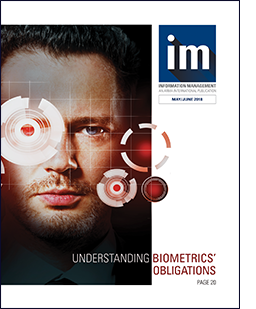 For information professionals, protecting personally identifiable information (PII) – defined in the ARMA glossary as “Any information that can be used in isolation or in combination with other sources to uniquely identify, contact, or locate a specific individual – is a high priority. But, although no PII is more unique than biometric information, many organizations are just now learning about the various types of biometric information that exists, for what it can be used, and how to protect it. This issue’s cover article, “Understanding Biometrics’ IG Obligations,” will quickly bring readers up to speed on the topic. The remainder of the issue focuses on various organizational challenges. One way to meet the challenge of designing and implementing an information governance (IG) program is to engage an outside consultant; our final article makes a case for it.
For information professionals, protecting personally identifiable information (PII) – defined in the ARMA glossary as “Any information that can be used in isolation or in combination with other sources to uniquely identify, contact, or locate a specific individual – is a high priority. But, although no PII is more unique than biometric information, many organizations are just now learning about the various types of biometric information that exists, for what it can be used, and how to protect it. This issue’s cover article, “Understanding Biometrics’ IG Obligations,” will quickly bring readers up to speed on the topic. The remainder of the issue focuses on various organizational challenges. One way to meet the challenge of designing and implementing an information governance (IG) program is to engage an outside consultant; our final article makes a case for it.
We’re interested in knowing for what projects your organization has engaged, is engaging, or is considering engaging an outside information management or IG consultant. Please take a minute to visit the multiple choice poll and tell us. You can also take or check the results of previous polls at http://imm.explorearma.org/RIM_Polls.
You can access this issue by clicking on the individual article links below or by visiting here to browse the issue. (If you need help navigating the format, please refer to our FAQs.)

InFocus: A Message from the Editor
Protecting Personal Information in the Age of 'Too Much Information'
Vicki Wiler
Up Front:
News, trends, and analysis of interest to you and your organization

Fellows Forum
Understanding Biometrics' IG Obligations
Judy Vasek Sitton, CRM, FAI
Because biometric identifiers can be especially sensitive examples of personally identifiable data, information management professionals must be aware of their proper use and their jurisdictional requirements. This article describes many types of biometrics in use today, and it summarizes the emerging legal landscape, with an eye on proper retention, protection, and destruction of biometric information.
William Saffady, Ph.D.
This excerpt from the just-published U.S. Record Retention Requirements: A Guide to 100 Commonly Encountered Record Series includes two of the 17 record series found under the Human Resources function: personnel records and employee training records. The book, whose 100 records series are divided among 14 functional areas, can be purchased in the ARMA International online bookstore at https://bit.ly/2KNgLLy.
Mentoring in the Age of #MeToo
William LeFevre, CRM, CA
In the last year, workers across industries have been buffeted by revelations about harassment and misconduct in work settings. With no societal consensus on what constitutes sexual harassment, organizations must establish guidance for proper behavior in collegial interactions – particularly in mentor/mentee relationships, where there is often an uneven balance of status or power.
The content below is available exclusively to professional and associate members of ARMA International. Others can learn more about this and the other benefits of membership by visiting our membership page or contacting our membership team at members@armaintl.org for personal assistance.

Business Matters
A Case for Outsourcing IG Program Design and Implementation
Aaron Bryant, IGP, PMP
The task of designing and integrating an IG program can be an overwhelming one in any size organization, as it is more than a full-time job. This Business Matters article makes the case for engaging an outside consultant to lead the project.
Tips from the Trenches
Diane K. Carlisle, IGP, CRM
The questions answered in this issue are: 1) Is it okay to automatically delete e-mail after 90 days if employees are alerted about the plan? How does an organization that has not had a records retention policy quickly reduce its volume of paper documents in preparation for a move? 2) If a company scans all its records, does it need to keep the hard copies? If it does keep the hard copies, is there a time frame for that and for where are they stored?
In Review
Be the Change: Driving Digital Transformation in Your Organization
Michelle Kirk, IGP, CRM
In Diving Digital: The Leader’s Guide to Business Transformation Through Technology, author Isaac Sacolick offers insight about building an effective, flexible IT organization and using the right tools to optimize its performance.

Welcome to the July/August 2018 issue of Information Management
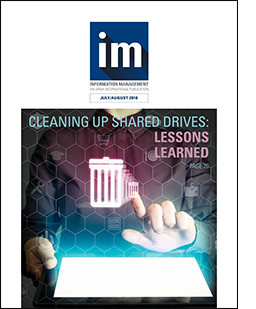 There’s a lot of truth in the adage “Experience is the best teacher” – but there’s nothing to say that the experience must be our own. Indeed, learning from others’ experiences is like taking a shortcut on a race to your goal; it can save time, energy, expense, and some stumbles along the way. We hope you’ll take advantage of the opportunity to learn from the experiences our authors have shared in their articles in this issue of Information Management. For example, Susan Cisco, Ph.D., CRM, FAI, conveys in our cover article what she learned by surveying and interviewing organizations about their experiences in cleaning up their shared drives.
There’s a lot of truth in the adage “Experience is the best teacher” – but there’s nothing to say that the experience must be our own. Indeed, learning from others’ experiences is like taking a shortcut on a race to your goal; it can save time, energy, expense, and some stumbles along the way. We hope you’ll take advantage of the opportunity to learn from the experiences our authors have shared in their articles in this issue of Information Management. For example, Susan Cisco, Ph.D., CRM, FAI, conveys in our cover article what she learned by surveying and interviewing organizations about their experiences in cleaning up their shared drives.
We’d like to know where your organization is in its efforts to clean up its shared drives. Please visit our 30-second multiple choice poll at http://imm.explorearma.org/shareddrives to let us know and to see how others are doing. You can also take or check the results of previous polls at http://imm.explorearma.org/RIM_Polls.
You can access this issue by clicking on the individual article links below or by visiting here to browse the issue. (If you need help navigating the format, please refer to our FAQs.

InFocus: A Message from the Editor
Experience is the Best Teacher, and Its Lessons Should Be Shared
Vicki Wiler
Up Front:
News, trends, and analysis of interest to you and your organization

Cleaning Up Shared Drives: Lessons Learned
Susan Cisco, Ph.D., CRM, FAI
ROT – redundant, outdated, and trivial information – is filling up organizations’ shared drives, creating unnecessary risks, driving up costs, and making it difficult for them to find the information they need to do business efficiently. Five organizations reveal why and how they cleaned up or have planned a cleanup of their shared drives.
The content below is available exclusively to professional and associate members of ARMA International. Others can learn more about this and the other benefits of membership by visiting our membership page or contacting our membership team at members@armaintl.org for personal assistance.
Achieving Nimble IM Programs Through Agile Methodology
Bruce W. Dearstyne, Ph.D.
Successfully test driving the use of agile methodology for IM projects can put organizations on the road to wide-scale adoption that will make them more nimble, innovative, profitable, and satisfying places to work.
Fellows Forum
Advice for Successful Mentoring Relationships
April Dmytrenko, CRM, FAI
Six Fellows of ARMA International recognize their mentors, share what they have learned about mentoring, and give advice for those interested in entering a mentoring relationship.

Personal Growth
IM Kata: Mindful Movement Through Our Work
Jeff Hutchings
The author shares how the precepts he has learned in his 25 years of karate practice can be applied to the professional practice of information management. He writes that the two practices are similar in that both are “mindful movement through predefined and structured sequences while maintaining mental attention to them. It is efficiency that is born out of keeping things simple.”
Answers to FAQ
William W. LeFevre, CRM, CA
The question answered in this issue is “Can you provide a user-friendly definition of metadata for non-records people?” William LeFevre provides an explanation that every layperson can understand. A sidebar includes ARMA’s definitions of metadata and related terms from the Glossary of Records and Information Management Terms, 5th Ed. (ARMA International TR22-2016) and an explanation about the importance of metadata from Metadata: A Basic Tutorial for Records Managers (ARMA TR03-2009).
In Review
The Algorithmic Lives We Don’t Lead
Marc Kosciejew, Ph.D.
In We are Data: Algorithms and the Making of Our Digital Selves, author John Cheney-Lippold critically explores the complex dynamics of algorithmic surveillance by illuminating its diverse forms and functions and their wide-ranging implications. How our online data is categorized affects our lives in ways that are often without our knowledge and can limit our capacity to act.
In Review
‘Untwingling’ Information Structures
Allan Thompson
Peter Morville’s book Intertwingled: Information Changes Everything examines how behaviors, culture, and assumptions shape the way we interact with information. The implicit point is that all these elements are related – simultaneously intertwined and mingled.

Thanks to Our Advertisers:
Welcome to the September/October 2018 issue of Information Management
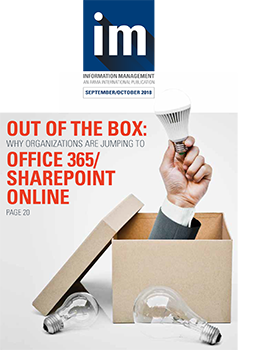 While information technology innovations have enabled or made many business processes, communications, and collaborations easier, faster, and less expensive than ever before, they have also led to exploding information volumes to manage, new legal risks to mediate, and integration problems to solve. Articles in this issue address some of these challenges, providing practical guidance for readers. If you’re dealing with the challenge of a recent or pending move to Office 365/SharePoint Online (O365/SPO), you’ll want to start with Mark Grysiuk’s cover article about that platform’s out-of-the-box capabilities.
While information technology innovations have enabled or made many business processes, communications, and collaborations easier, faster, and less expensive than ever before, they have also led to exploding information volumes to manage, new legal risks to mediate, and integration problems to solve. Articles in this issue address some of these challenges, providing practical guidance for readers. If you’re dealing with the challenge of a recent or pending move to Office 365/SharePoint Online (O365/SPO), you’ll want to start with Mark Grysiuk’s cover article about that platform’s out-of-the-box capabilities.
We’d like to know whether your organization has moved to Office 365 or similar products/services. Please visit our 30-second multiple choice poll at http://imm.explorearma.org/O365 to let us know and to what others are using. You can also take or check the results of previous polls at http://imm.explorearma.org/RIM_Polls.
You can access this issue by clicking on the individual article links below or by visiting here to browse the issue. (If you need help navigating the format, please refer to our FAQs.

InFocus: A Message from the Editor
From Electronic to Historical Information: Challenges and Opportunities for IM
Vicki Wiler
Up Front:
News, trends, and analysis of interest to you and your organization

Out of the Box: Why Organizations Are Jumping to Office 365/SharePoint Online
Mark Grysiuk, CRM, CIP
This article provides an overview of out-of-the-box Office 365/SharePoint Online functionality and what organizations can and should do with it.
The content below is available exclusively to professional and associate members of ARMA International. Others can learn more about this and the other benefits of membership by visiting our membership page or contacting our membership team at members@armaintl.org for personal assistance.
Fellows Forum
Social Media Cases Illustrate the Loosening Court Trends in E-Discovery
John Isaza, Esq., FAI, and Brent Martindale, Esq.
This article explores the scope of discovery in social media and considers cases that delve into the courts’ treatment of discovery sanction requests since the passage of the revised Federal Rules of Civil Procedure in December 2015. The case decisions demonstrate how much the pendulum has swung in the direction of limiting discovery sanctions.
Leveraging Legacy Historical Records to Create Organizational Value
William W. LeFevre, CRM, CA
Many organizations, including Ford and Coca Cola, have employed historians and authors to tell their corporate stories as a way to promote their brands. Information professionals have an opportunity to step into this role, working with other stakeholders to appraise their organizations’ historical materials for marketing and other potential uses.

Industry Specific
IG in U.S. Federal Agencies: Balancing Information Value and Risk
Lauren Allen and Kathleen Allison
Between the explosion of digital records in government and the growing calls for transparency and accountability, many federal leaders are rethinking their information strategies. It’s becoming apparent that modernization requires a proactive, integrated approach to information governance.
Answers to FAQ
Diane Carlisle, IGP, CRM
The question answered in this issue is “Who should be on the information governance steering committee and what are this group’s primary responsibilities?” Carlisle writes about the IG team stakeholders and draws on Bill Saffady’s Information Governance Concepts, Requirements, Technologies to describe each team member’s role.
In Review
What a Chief Data Officer Needs to Know
Kurt Brenneman
Caroline Carruthers and Peter Jackson wrote The Chief Data Officer’s Playbook for new chief data officers (CDOs) and hiring organizations to resolve confusion about what a CDO does. Kurt Brenneman recommends it as a pragmatic, nontechnical manual, recommended for new and experienced CDOs.
In Review
Tempering Our Number Fixation with Good Judgment
Lara Mancuso, Ph.D.
Jerry Muller’s The Tyranny of Metrics is a welcome reminder that while quantitative metrics has its place in organizations, it should be used wisely and paired with careful judgement. Lara Mancuso writes that the book is engaging and convincing, and its main takeaways are pertinent, current, and applicable to other fields.

Thanks to Our Advertisers:
- Baypath University
- e-Image Data
- Institute of Certified Records Managers
- NAID
- San José State University
- OPEX Corp
Welcome to the November/December 2018 issue of Information Management
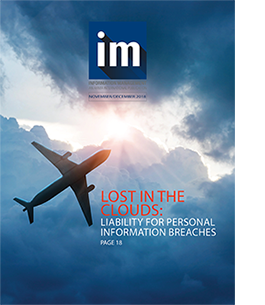 With this issue, we wrap up our 52nd volume year and look forward to exciting changes the New Year will bring for Information Management magazine. Front and center will be a move from the digital format we’ve used the past several years to an online presentation that will eliminate log in problems and make the magazine more accessible and shareable. The new site, which we’ll unveil in January, will be similar to Information Governance Magazine published by the Information Governance Coalition, which merged last month with ARMA International.
With this issue, we wrap up our 52nd volume year and look forward to exciting changes the New Year will bring for Information Management magazine. Front and center will be a move from the digital format we’ve used the past several years to an online presentation that will eliminate log in problems and make the magazine more accessible and shareable. The new site, which we’ll unveil in January, will be similar to Information Governance Magazine published by the Information Governance Coalition, which merged last month with ARMA International.
Also debuting in May of next year will be a research-based, academic-focused issue that will feature peer-reviewed articles and executive summaries of research solicited and refereed by the ARMA International Educational Foundation (AIEF). This issue features two articles based on 2018 AIEF research reports, including "Big Bucket Retention Objectives, Issues, Outcomes" by William Saffady, Ph.D., FAI.
We’d like to know about your organization’s use of big bucket retention schedules. Please visit our latest poll at http://imm.explorearma.org/BigBuckets to select the answer that best applies to your organization. You can also take or check the results of previous polls at http://imm.explorearma.org/RIM_Polls.
Access this issue by clicking on the individual article links below or by visiting here to browse the issue. (If you need help navigating the format, please refer to our FAQs.

InFocus: A Message from the Editor
Clouds, Buckets, and Cryptocurrencies, “Oh, My!”
Vicki Wiler
Up Front:
News, trends, and analysis of interest to you and your organization

Lost In The Clouds: Liability For Personal Information Breaches
John C. Montaña, J.D., FAI
This article summarizes several U.S. Court decisions regarding liability in breaches of personal information collected by third-party service providers on the behalf of other organizations. This is just one aspect of a study of information management-related cases that was solicited by the ARMA International Educational Foundation and underwritten by the ARMA Metro New York City Chapter.
The content below is available exclusively to professional and associate members of ARMA International. Others can learn more about this and the other benefits of membership by visiting our membership page or contacting our membership team at members@armaintl.org for personal assistance.
Fellows Forum
Blockchain Redux - Cracking the Code on Cryptocurrencies
Nancy Dupre Barnes, Ph.D., CRM, CA
This article focuses on a facet of blockchain – cryptocurrencies – which are also known as virtual currencies, crypto coins, digital assets, or digital coins.
Big Bucket Retention Objectives, Issues
William Saffady, Ph.D., FAI
Fifteen years after its introduction by the U.S. National Archives and Records Administration as a strategy for improving federal agencies recordkeeping performance, the big bucket approach to record retention is in common use. This article summarizes an interview-based study of the objectives, issues, and outcomes of current big bucket retention initiatives in 14 organizations. The study was conceptualized and underwritten by the ARMA International Educational Foundation, www.armaedfoundation.org.

Tips from the Trenches
Judy Vasek Sitton, CRM, FAI
This article answers the question, “With fingerprint security technology now used in so many businesses for secured door access, what category does it fall under (e.g., personally identifiable information? How is the data deleted upon employee termination?”
In Review
New Edition on Metadata Use Provides ‘Tutorial’
Sarah R. Demb
David Haynes’ Metadata for Information Management and Retrieval: Understanding Metadata and its Uses, 2nd ed. uses examples of document-based content, museum objects, and digital resources to reveal how metadata operates, from the perspective of the user and the manager.
In Review
To Improve Your Information Systems, You Must Understand the Architecture
Brett Wise, IGP, CRM, FIP, CIP
In Information Systems: Process and Practice, Christine Urquhart and a group of highly respected researchers explore how information architecture can help information professionals meet the challenges of today’s technology-driven world and capitalize on the power of data management.
ARMA: For Your Information
Association News: Fellows, Britt Literary, Other Winners Named at ARMA Live! 2018
Information Governance Body of Knowledge Published
ARMA International, Information Coalition Merge

Thanks to Our Advertisers:
